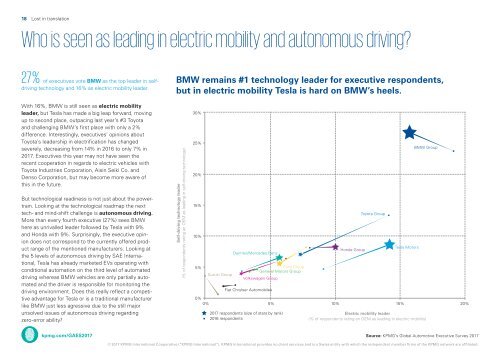Global Automotive Executive Survey 2017
global-automotive-executive-survey-2017
global-automotive-executive-survey-2017
Create successful ePaper yourself
Turn your PDF publications into a flip-book with our unique Google optimized e-Paper software.
18 Lost in translation<br />
Who is seen as leading in electric mobility and autonomous driving?<br />
27 % of executives vote BMW as the top leader in selfdriving<br />
technology and 16% as electric mobility leader.<br />
BMW remains #1 technology leader for executive respondents,<br />
but in electric mobility Tesla is hard on BMW’s heels.<br />
With 16%, BMW is still seen as electric mobility<br />
leader, but Tesla has made a big leap forward, moving<br />
up to second place, outpacing last year’s #3 Toyota<br />
and challenging BMW’s first place with only a 2%<br />
difference. Interestingly, executives’ opinions about<br />
Toyota’s leadership in electrification has changed<br />
severely, decreasing from 14% in 2016 to only 7% in<br />
<strong>2017</strong>. <strong>Executive</strong>s this year may not have seen the<br />
recent cooperation in regards to electric vehicles with<br />
Toyota Industries Corporation, Aisin Seiki Co. and<br />
Denso Corporation, but may become more aware of<br />
this in the future.<br />
But technological readiness is not just about the powertrain.<br />
Looking at the technological roadmap the next<br />
tech- and mind-shift challenge is autonomous driving.<br />
More than every fourth executive (27%) sees BMW<br />
here as unrivalled leader followed by Tesla with 9%<br />
and Honda with 9%. Surprisingly, the executive opinion<br />
does not correspond to the currently offered product<br />
range of the mentioned manufacturers. Looking at<br />
the 5 levels of autonomous driving by SAE International,<br />
Tesla has already marketed EVs operating with<br />
conditional automation on the third level of automated<br />
driving whereas BMW vehicles are only partially automated<br />
and the driver is responsible for monitoring the<br />
driving environment. Does this really reflect a competitive<br />
advantage for Tesla or is a traditional manufacturer<br />
like BMW just less agressive due to the still major<br />
unsolved issues of autonomous driving regarding<br />
zero-error ability?<br />
Self-driving technology leader<br />
(% of respondents rating an OEM as leading in self-driving technology)<br />
30%<br />
25%<br />
20%<br />
15%<br />
10%<br />
5%<br />
Suzuki Group<br />
Daimler/Mercedes Benz<br />
Volkswagen Group<br />
Fiat Chrylser Automobiles<br />
Ford Group<br />
General Motors Group<br />
Honda Group<br />
Toyota Group<br />
Tesla Motors<br />
BMW Group<br />
0%<br />
0% 5% 10% 15% 20%<br />
<strong>2017</strong> respondents (size of stars by rank)<br />
2016 respondents<br />
Electric mobility leader<br />
(% of respondents rating an OEM as leading in electric mobility)<br />
kpmg.com/GAES<strong>2017</strong><br />
Source: KPMG’s <strong>Global</strong> <strong>Automotive</strong> <strong>Executive</strong> <strong>Survey</strong> <strong>2017</strong><br />
© <strong>2017</strong> KPMG International Cooperative (“KPMG International”). KPMG International provides no client services and is a Swiss entity with which the independent member firms of the KPMG network are affiliated.



